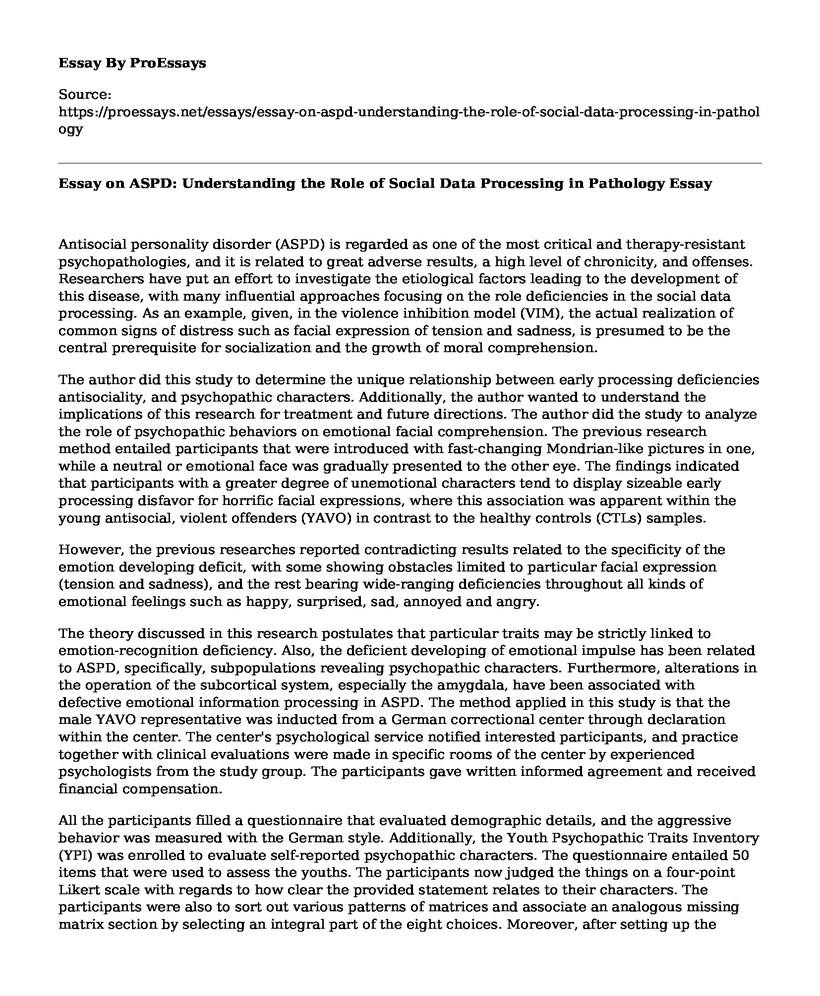Antisocial personality disorder (ASPD) is regarded as one of the most critical and therapy-resistant psychopathologies, and it is related to great adverse results, a high level of chronicity, and offenses. Researchers have put an effort to investigate the etiological factors leading to the development of this disease, with many influential approaches focusing on the role deficiencies in the social data processing. As an example, given, in the violence inhibition model (VIM), the actual realization of common signs of distress such as facial expression of tension and sadness, is presumed to be the central prerequisite for socialization and the growth of moral comprehension.
The author did this study to determine the unique relationship between early processing deficiencies antisociality, and psychopathic characters. Additionally, the author wanted to understand the implications of this research for treatment and future directions. The author did the study to analyze the role of psychopathic behaviors on emotional facial comprehension. The previous research method entailed participants that were introduced with fast-changing Mondrian-like pictures in one, while a neutral or emotional face was gradually presented to the other eye. The findings indicated that participants with a greater degree of unemotional characters tend to display sizeable early processing disfavor for horrific facial expressions, where this association was apparent within the young antisocial, violent offenders (YAVO) in contrast to the healthy controls (CTLs) samples.
However, the previous researches reported contradicting results related to the specificity of the emotion developing deficit, with some showing obstacles limited to particular facial expression (tension and sadness), and the rest bearing wide-ranging deficiencies throughout all kinds of emotional feelings such as happy, surprised, sad, annoyed and angry.
The theory discussed in this research postulates that particular traits may be strictly linked to emotion-recognition deficiency. Also, the deficient developing of emotional impulse has been related to ASPD, specifically, subpopulations revealing psychopathic characters. Furthermore, alterations in the operation of the subcortical system, especially the amygdala, have been associated with defective emotional information processing in ASPD. The method applied in this study is that the male YAVO representative was inducted from a German correctional center through declaration within the center. The center's psychological service notified interested participants, and practice together with clinical evaluations were made in specific rooms of the center by experienced psychologists from the study group. The participants gave written informed agreement and received financial compensation.
All the participants filled a questionnaire that evaluated demographic details, and the aggressive behavior was measured with the German style. Additionally, the Youth Psychopathic Traits Inventory (YPI) was enrolled to evaluate self-reported psychopathic characters. The questionnaire entailed 50 items that were used to assess the youths. The participants now judged the things on a four-point Likert scale with regards to how clear the provided statement relates to their characters. The participants were also to sort out various patterns of matrices and associate an analogous missing matrix section by selecting an integral part of the eight choices. Moreover, after setting up the binocular arrangement with an evaluation stimulus, the participants were asked to show as quickly and correctly as possible which of the four likely areas the face stimuli or any other area of the face had emerged. The participants took part in eight trials before the actual experiment.
Conclusion
The results of the finding displayed that the groups of participants did not vary in terms of age. When the YAVO were compared to CTLs, the YAVO showed significantly greater self-reported aggression and psychopathy. In conclusion, the findings presented by the study showed that the presence of an emotion processing deficient in antisocial people at the fundamental stages of processing and indicates their close relation to psychopathic characters. The new information we have now from the research is that it gives an insight into the critical clinical suggestions for the invention of new treatment approaches.
Cite this page
Essay on ASPD: Understanding the Role of Social Data Processing in Pathology. (2023, Jun 19). Retrieved from https://proessays.net/essays/essay-on-aspd-understanding-the-role-of-social-data-processing-in-pathology
If you are the original author of this essay and no longer wish to have it published on the ProEssays website, please click below to request its removal:
- Modern Meaning of Love and Relationship
- Essay Sample on Enneagram of Personality
- Essay Sample on Overcoming Anxiety: A Guide to Understanding and Coping With Anxiety Disorders
- Essay Sample on Achieving Happiness: The Power of Positive Living
- Essay Example on Mental and Emotional Health: Impact on Bodily Health
- Essay Example on Effective Communication: The Key to Success in Organizations
- Paper on Analyzing the Termination Decision: Workplace Misconduct at William Beaumont Hospital







